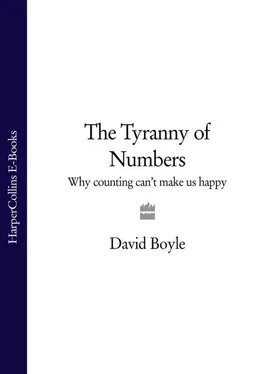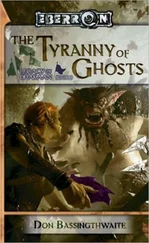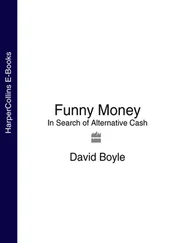‘If you cannot be a good accountant, you will grope your way forward like a blind man and may meet great losses,’ said Pacioli, the first accountant. He explained that it was all a matter of taking a piece of paper, listing all the debit totals on one side and all the credit totals on the other. If they add up and there’s a profit – the result is happiness, he said, sounding like a Renaissance Mr Micawber. If not, you have to find out where the mistake is – as millions of frustrated amateur accountants have been doing ever since.
Within three centuries, accountants had developed into the professionals you called in after bankruptcy, a kind of undertakers for the business world, which is why the Companies Act of 1862 which regulated such matters became known as ‘the accountant’s friend’. ‘The whole affairs in bankruptcy have been handed over to an ignorant set of men called accountants, which was one of the greatest abuses ever introduced into law,’ said Mr Justice Quinn during a bankruptcy case in 1875. By 1790, the Post Office directory for London lists one accountant. By 1840 there were 107 of them and by 1845 – right in the middle of the railway boom – there were 210, ready to assist cleaning up the mess in the financial collapse the following year. Maybe they were even responsible for the rash of suicides in London in 1846; maybe they helped prevent more. We shall never know. Either way, it was just the beginning for the accountants. By the turn of the century there were over 6,000 in England and Wales. Now there are 109,000, but – as far as I know – no counting horses left at all.
Pacioli and his spiritual descendants have helped to create the modern world with its obsession with counting, and the strange idea that once you have counted the money, you have counted everything. There is a hard-headed myth that numbers are serious and words are not – that counting things is a rigorous business for a serious man’s world. ‘When you can measure what you are speaking of and express it in terms of numbers, you know something about it,’ said the scientist Lord Kelvin. ‘When you cannot express it in terms of numbers your knowledge of it is of a meagre kind.’
Armed with this attitude, Lord Kelvin dismissed radio as pointless, aeroplanes as impossible and X-rays as a hoax, so we might wonder if he was right. But is my knowledge really of a meagre kind? Can I express something about myself in numbers? If Lord Kelvin’s successors managed to express my entire genetic code in numbers, would they know me better than I do myself when I can do no such thing? Well, in some ways, maybe they can – but I doubt it. Any more than the Nazis could know anything about the victims in concentration camps by branding a unique number on their arms.
We are more than branded now. We are in a world obsessed with numbers, from National Insurance and interest rates to buses, from bank balances and bar codes to the cacophony of statistics forced on us by journalists, politicians and marketeers. They seem to agree with Lord Kelvin that it provides us with a kind of exactitude. Actually it is exact about some of the least interesting things, but silent on wider and increasingly important truths.
We have to count. I’ve used piles of statistics in this book. Not counting is like saying that numbers are evil, which is even more pointless than saying that money is evil. We need to be able to count, even if the results aren’t very accurate. ‘Without number, we can understand nothing and know nothing,’ said the philosopher Philolaus in the fifth century BC, and he was right. But 25 centuries after Philolaus, the French philosopher Alain Badiou put the other point of view, and he was right too: ‘what arises from an event in perfect truth can never be counted’. Both Philolaus and Badiou are right. The more we rely on numbers to understand problems or measure aspects of human life, the more it slips through our fingers and we find ourselves clinging to something less than we wanted. Because every person, every thing, every event is actually unique and unmeasurable.
This is the paradox. If we don’t count something, it gets ignored. If we do count it, it gets perverted. We need to count yet the counters are taking over our lives. ‘The measurable has conquered almost the entire field of the sciences and has discredited every branch in which it is not valid,’ said the French poet Paul Valery. ‘The applied sciences are almost completely dominated by measurement. Life itself, which is already half enslaved, circumscribed, streamlined, or reduced to a state of subjection, has great difficulty in defending itself against the tyranny of timetables, statistics, quantitative measurements and precision instruments, a whole development that goes on reducing life’s diversity, diminishing its uncertainty, improving the functioning of the whole, making its course surer, longer and more mechanical.’
There was a time when numbers had significance beyond just ‘how many’, but we have lost the ancient understanding of numbers as beautiful and meaning something beyond themselves – the discredited and forgotten wisdom of Augustine and Pythagoras. We snigger patronizingly when we read St Thomas Aquinas’s solemn injunction that 144,000 would be saved at the end of time. Though probably the last thing he meant was that literally 144,000 people would make it to heaven. To Aquinas, a thousand meant perfection, and the 144 is the number of the apostles multiplied by itself. ‘I speak in parables of eternal wisdom, my honoured sir,’ he might have said, like a character in Andrew Sinclair’s novel Gog. ‘I leave statistics to plumbers.’
The old way of looking at numbers means nothing to us now. The historian of the medieval mind Alfred Crosby called it the ‘venerable model’. ‘We sniff and cluck at its mistakes – that the earth is the centre of the universe, for instance – but our real problem with the Venerable Model is that it is dramatic, even melodramatic, and teleological: God and Purpose loom over all,’ he wrote. ‘We want (or think we want) explanations of reality leeched of emotion, as bloodless as distilled water.’
Bloodless one-dimensional messing can dismiss a horse so sensitive that it can read the faintest human gestures, just because it doesn’t meet our narrow definition of intelligence.
Bizarre measurement No. 2
Momme
(Unit of mass in Japan used for measuring the size of pearls. 1 momme = 10 fun.)
Amount of time the average American spends going through junk mail in a lifetime: 8 months
Amount spent by Americans every year breaking into broken automatic car locks: $400 million
Chapter 2 Historical Interlude 1: Legislator for the World
Nature has placed Mankind under the governance of two sovereign masters, pain and pleasure. It is in them alone to point out what we ought to do, as much as what we shall do.
Jeremy Bentham
There is nothing which has yet been contrived by man, by which so much happiness is produced as by a good tavern or inn.
Samuel Johnson,21 March 1776
It was one of the strangest funerals ever held. Three days after his death on 6 June 1832, the body of the great utilitarian philosopher Jeremy Bentham (dressed in a nightshirt) was unveiled to his friends and admirers, gathered together at the Webb Street School of Anatomy in London. It was a stormy early evening, and the grisly occasion was lit by flashes of lightning from the skylight above, as Bentham’s young doctor Thomas Southwood Smith began a speech which included a demonstration of dissection on his old friend.
Читать дальше












